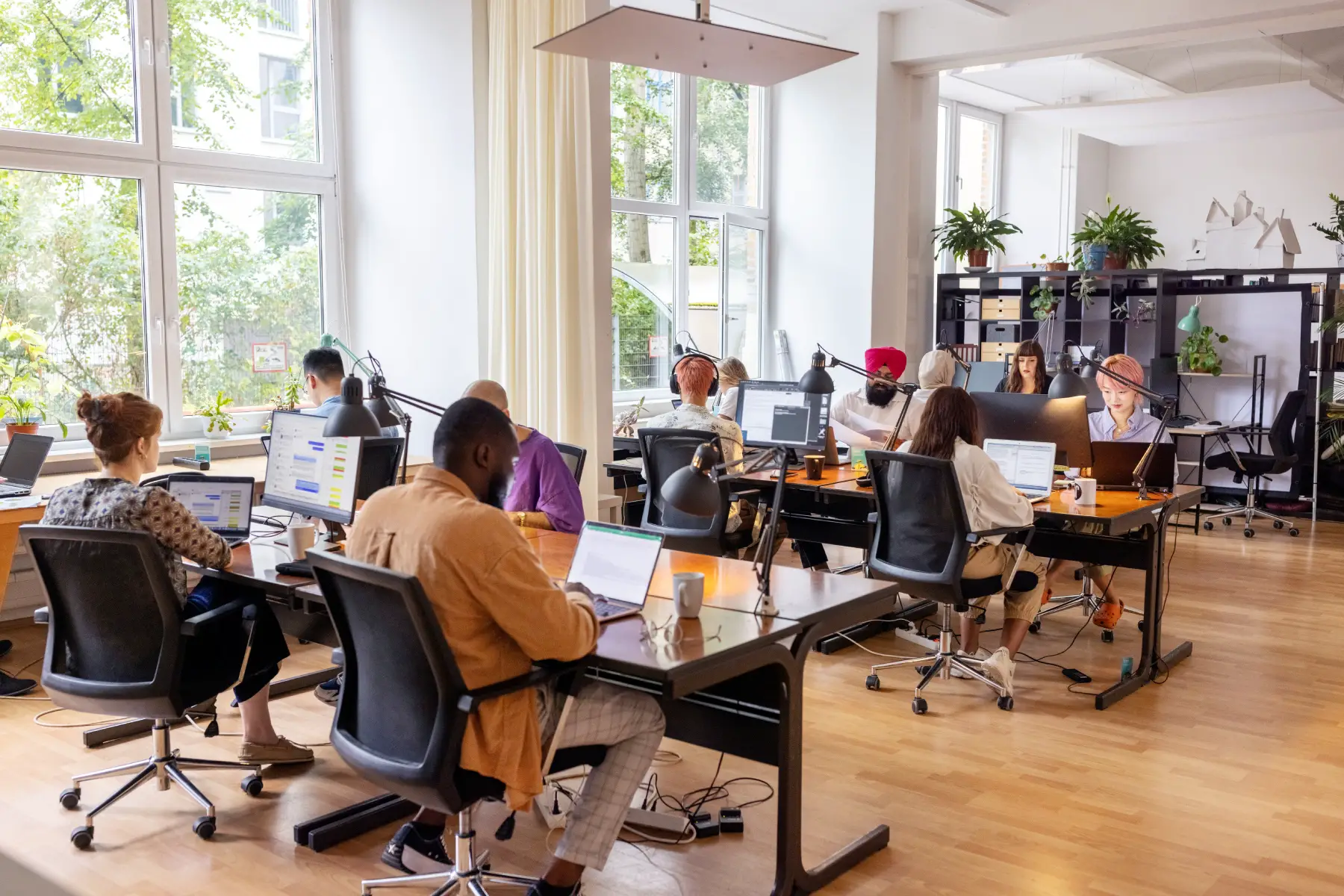Understanding German business culture is vital to developing your career in the country. It is also important to know how to interact and communicate with clients and colleagues. For instance, Germans sometimes have a reputation for being rude or cold in work settings. However, this actually boils down to them valuing directness and prioritizing tasks over socializing during work hours. Being aware of this cultural trait can significantly influence how you perceive and work with others in Germany.
So, to help you improve your chances of fitting in with others in the workplace, this article explains the following:
- Business in Germany
- What is the business culture like in Germany?
- Is there a good work-life balance in Germany?
- Business structure and hierarchy
- Does Germany have a diverse work culture?
- How are women perceived in the workplace?
- How is business conducted in Germany?
- Business etiquette in Germany
- Do employees in Germany get social security?
- How do German businesses contribute to society?
- Business corruption and fraud in Germany
- Useful resources
Helden.de
Cover your business for professional liability with helden.de. This German insurance company provides a range of policies, each of which comes at a flat rate with transparent pricing. helden.de operate completely digitally, allowing you to handle your coverage quickly and simply. Find a policy to suit your company with helden.de.
Business in Germany
Germany attracts many international professionals thanks to its progressive values, high quality of life, and strong economy. So much so that the country boasts the largest economy in the European Union (EU). At the same time, German employees work fewer hours on average each year compared to neighboring countries like Italy and France.
Germany’s low birth has led the German government to focus on encouraging international talent in the workforce. For example, programs such as Make it in Germany are designed to attract skilled workers from overseas to help counteract the decline in population.

Germany is home to several high-performing industries that contribute to the country’s economic success. The best-performing industries in Germany include:
- Automotive
- Chemistry and pharmaceuticals
- Electrical engineering and electronics
- Health care
- Information technology and telecommunications
- Mechanical and plant engineering
While Germany is known as the birthplace of global brands such as BMW, more than half of the total workforce in the country works in small and medium-sized enterprises. As a result, migrants may be eligible for work visas, even in small-scale companies. Self-employment or freelance visas can also grant long-term permission to live in Germany.
In 2023, the German economy entered a recession due to factors such as inflation and Russia’s invasion of Ukraine. However, the German Bundesbank expects modest growth as the economy rebounds from these pressures.
Germany still maintains a high rate of employment, with 77% of the population being in the workforce. Consequently, the country’s unemployment rate (3% in 2023) is lower than in many other EU countries.
The cost of living is also favorable in Germany, and lower than in the United Kingdom and France. What’s more, the country boasts the second-highest minimum wage in the EU at €12 per hour (as of 2023).
What is the business culture like in Germany?
Germans have a reputation for preferring structured formality. This appears in the business hierarchy where decision-making is often handled by those at the top. Public criticism of higher-ranking employees is also uncommon and many employees address each other with their title and surname.
Notably, personal life and work life do not mix as often in Germany as in other countries. Moreover, it is uncommon to start a meeting with small talk or discuss personal plans outside of the workplace. Punctuality is also important, and meetings often come with a pre-set agenda.
Generally speaking, projects tend to be formal and rely on well-documented plans that include contingency options. Making changes to the plan is also less common than you might expect in other cultures, even when there appears to be a good reason for changing things.
However, while German business culture can be quite formal, there are differences from business to business, and from industry to industry. Therefore, you should not expect to find the same standards in a start-up in Berlin as you would in a finance office in Munich. That said, as a general rule, the more formal the business, the more likely it is that the business culture will follow traditional formal practices.
Is there a good work-life balance in Germany?
Despite their reputation for having rigid rules and working hard, Germans also treasure leisure time. Indeed, the concept of Feirerabend, which refers to the valued time when you stop working and find leisure, still persists. Several large German employers have also adopted disconnect policies that state that employees do not have to answer work emails after working hours.
However, a survey commissioned by Novotel found that Germans have less leisure time than the British and the Polish. And while the COVID-19 pandemic increased the number of Germans working from home, many have opted to work during times when they would otherwise be commuting or enjoying leisure activities.

So although the pandemic blurred the lines between work and home, Germany still ranks 16th out of 41 countries for work-life balance in the OECD Better Life Index.
Time and space in German business culture
As of 2021, the average full-time employee in Germany works 41 hours per week. Most office workers start their day between 08:00 and 09:00 and end between 17:00 and 18:00. Notably, German labor laws prohibit working on Sundays in many industries.
As mentioned, working from home has taken off in recent years since the pandemic challenged traditional office work standards. Interestingly, the government considered regulating work from home as an employee right but has since decided to leave the decision with individual businesses. However, even without a legal requirement, a quarter of employees in Germany continue to work from home.
Whether you are working from home or on-site, punctuality is highly valued in German business culture. Therefore, meetings will start at the scheduled time, and arriving a few minutes early is viewed favorably. Consistently arriving late, on the other hand, is seen as disrespectful and poor professional behavior.
Time off varies across Germany as regional governments set public holidays. However, employees that work a 5-day work week are entitled to a minimum of 20 days of paid holiday leave per year. That said, many companies offer 25 vacation days or more.
Self-employment and freelance visas allow expats to live and work in Germany without being sponsored by a local business. Digital nomads may also be able to establish themselves in the country if they meet the criteria for one of these visas.
Business structure and hierarchy
German businesses often embrace a vertical hierarchical structure. This means the business will have a clear chain of command, with decision-making authority concentrated at the top. Indeed, top-level management in these businesses holds significant power and responsibility for setting strategic direction.
Even within a vertical hierarchy, German leadership styles tend to emphasize team collaboration and employee participation. Input is valued from individual members and teams tend to feel a sense of collective ownership of goals and outcomes.
However, as the working-from-home culture has taken off, German businesses have felt the challenge of managing remote teams and aligning new methods with more traditional participation.
Traditional businesses continue to embrace a hierarchical approach, while newer startups often have a flatter structure and less centralized decision-making.
Does Germany have a diverse work culture?
Germany has an increasingly diverse population. As of 2022, nearly a quarter of the country’s inhabitants had a history of immigration. Population diversity is also represented in the workplace, and protected by Germany’s laws.
The German government encourages skilled migrants to immigrate to the country and continues to adapt legal requirements to draw them in. Reforms to the Skilled Immigration Act in 2023 have also broadened the definition of “qualified professionals” and added options to fast-track visa applications.
A 2021 Randstad-ifo survey found that workplace diversity was a key topic of interest for German businesses, although many struggled to measure diversity outcomes. This is due to several reasons, including the fact that strict data privacy laws in the country limit the demographic information that companies can gather from their employees.

It is easier to compare Germany’s diversity in the workplace when considering specific employment groups. For instance, the country ranks 11th in the EU (PDF) for its employment rate of workers with disabilities. Meanwhile, the annual Rainbow Report review of human rights for LGBTQIA+ individuals ranks Germany 15th out of 49 countries.
The German government has taken several steps to improve equality for the LGBTQIA+ community in recent years. Consequently, the Equality Index gives the country a score of 84 out of 100 for its equality efforts. What’s more, in 2022, it was announced that the bureaucratic process for making legal gender changes would be simplified.
How are women perceived in the workplace?
The German constitution supports equal rights for men and women. Furthermore, the country tends to perform well when it comes to gender equality measures. For instance, it ranks 10th out of 146 countries in the Global Gender Pay Gap Report (PDF).
However, childcare responsibilities tend to fall more on women than men in Germany. This reality was heightened during the pandemic when significantly more women spent dedicated time caring for their children than men.
Germany scores 68.7 out of 100 on the 2022 Gender Equality Index, placing it just slightly ahead of the EU average of 68.6. This also applies to equality in the workplace, which is just above the EU average.
Gender equality informs German laws, as well as legislative policy. In 2023, the German Foreign Minister launched Feminist Foreign Policy guidelines that aim to keep gender equality and women’s rights as objectives when determining international relations.
Women’s participation and representation in the workplace
While women’s participation in employment in Germany lags somewhat behind men, it is less separated than in other EU countries.
Around 73% of working-age women are employed, compared to roughly 80% of men. While this statistic does not consider the difference between full-time and part-time work, it does help to demonstrate that Germany has one of the highest ratios of women working part-time compared to men.
Despite this, women are still left out of executive roles in the workplace. As a result, only 29% of executive positions in Germany were held by women in 2021.
However, one area where Germany has shown progression is with its female public office leaders. For example, Angela Merkel was the longest-serving head of state in consecutive sessions globally, presiding for over 16 years.
Do women earn as much as men in Germany?
According to government reports, women across Germany earn on average 18% less per hour than men. Interestingly, those in Western Germany and Berlin face a markedly higher pay gap (19%) when compared to Eastern Germany (7%).
The same report finds that some of Germany’s largest industries also have wider gender pay gaps. Those with the greatest differences in earnings include:
- Financial and insurance activities (27%)
- Human health and social work activities (21%)
- Information and communication (22%)
Germany introduced a Pay Transparency Act (Entgelttransparenzgesetz) in 2021, which offers an individual right to information for employees. Employers who receive a valid request must disclose:
- Relevant comparative compensation measures
- Statistic median of the average monthly gross remuneration that the opposite gender receives
- The criteria used to determine the employee’s compensation
Attitudes towards women in the workplace
While Germany is often considered to be fairly progressive in terms of gender equality, some stereotypes persist. For example, women are more likely to take on childcare and household tasks. They also face pressure to carry out duties to the detriment of their professional career. As a result, a much higher proportion of women take on part-time work when compared to men.
Although sexual harassment is illegal in Germany, it still occurs. In fact, a 2020 YouGov survey (PDF) found that 54% of German female participants had experienced it in their life.
If you experience harassment at work in Germany, you can report it to your employer or trade union representative. In cases of sexual assault, you can also contact the Helpline for Violence Against Women online or by phone.
How is business conducted in Germany?
Business strategy, planning, and decision-making
Germany is home to complex bureaucracy, which can also be felt in business environments. Most companies in the country rely on detailed strategic plans and operating guides to function. Decision-making tends to be hierarchical, particularly in traditional businesses and industries such as finance.

All of this planning can lead to slower business progression as German business leaders are less likely to move forward with a project before a complete plan is finalized. This generally stems from a desire to avoid uncertainty.
How are business meetings and negotiations handled?
Business meetings in Germany are common and formal. In general, you should expect:
- Formal agendas with little room for deviation
- Limited small talk as meetings tend to flow quickly
- Meetings to begin and end as scheduled
- Punctuality to be valued and expected
- Reliance on subject matter experts to inform decision-makers
Notably, while direct criticism of business leaders is uncommon, feedback on project plans and objectives is typically welcomed.
Negotiations in Germany can also be lengthy due to the extensive fact-finding stage before decisions are made. Most agreements, including work contracts, are put into writing.
Business networking in Germany
Networking is as beneficial for career growth in Germany as it is in many other countries. And while Germans are known for valuing direct communication, personal connections can still influence career opportunities. Therefore, job fairs and networking events are useful for building your network, in addition to networking online.
The following resources can help you build your network in Germany:
- Business Network International (BNI) – Germany: A professional networking society with branches around the globe
- LinkedIn: Used for networking in Germany and worldwide
- Make it in Germany: Run by the German government
- Tech Open Air: A Berlin-based technology conference
- Xing: A LinkedIn competitor used by many in Germany for networking and finding jobs
Business socializing in Germany
Communication between colleagues in Germany is generally related to work rather than personal life. And while it’s not impossible to make friends at work, it is not as common as it is in some other countries.
Since many Germans separate work from leisure time, it should come as no surprise that business talk usually doesn’t interfere with social time either. Therefore, work lunches and dinners are typically reserved for finalizing negotiations or celebrating a business win.
Business etiquette in Germany
Communication
A firm but brief handshake is standard when meeting people for the first time in Germany. A verbal greeting, such as Guten Tag (good day), should also accompany this.
Men are addressed as Herr (Mr.) and women as Frau (Ms.), along with any professional honorific. For example, you would greet a female colleague that holds a doctorate as Frau Doktor. In more casual settings, however, you can simply refer to colleagues as Herr or Frau.
It is important to note that calling your colleagues by their first name is only practiced in casual work environments and is more common in multinational organizations or startups.

Generally speaking, Germans communicate very directly and explicitly. They also formulate important statements directly and openly. While this can appear rude to others, it is important to remember that the speaker likely does not mean it to be or even notice.
In return, they do not always recognize and respond to verbal subtleties such as indirect hints, messages that require them to ‘read between the lines’, or non-verbal signals.
Dress code
Professional clothing in Germany is traditional and conservative, particularly in sectors such as finance and insurance. For an interview or formal business meeting, a suit is typical for men and women. Ties may be a bit more colorful, but the overall look is generally muted.
Day-to-day work attire, on the other hand, can be a bit more relaxed. However, this will depend on the corporate culture. For instance, while multinationals and startups have evolved the most to embrace jeans and casual shirts, there are still plenty of businesses that expect more formal clothing at work.
Gifts
German business culture does not dictate gift-giving during meetings. In fact, presents are typically viewed as more personal, and therefore not part of the work environment.
That said, if you do bring a gift, it should be small and not overly expensive. Work-related memorabilia such as quality pens or stationery are a good option.
Business cards
It is still common to exchange business cards when meeting a professional contact for the first time in Germany. However, this is not always expected and is only done to share necessary contact details. Moreover, you should only share your details to establish the necessary contact to further a project.
Do employees in Germany get social security?
All employees and employers contribute towards social security in Germany. These contributions support benefits including:
- Pensions
- Public healthcare
- Unemployment insurance
Notably, those who are self-employed or freelance workers do not contribute towards social security in the same way. Depending on their circumstances, they may also face restricted access to benefits.
Health insurance is required in Germany, and most employees have statutory health insurance which grants them access to public healthcare. That said, some people choose to purchase supplementary private health insurance to cover any additional costs. This is also required by self-employed and freelance workers.
Expats in Germany can benefit from the national pension system after working in the country for five years. Those working in another EU country or UK citizens who file for a qualifying retirement plan may also access it.
In addition to the national pension system, some employers offer supplemental pension plans to boost employee retirement savings contributions.
How do German businesses contribute to society?
Social principles aimed at supporting the community, both locally and globally, underpin German business culture. Moreover, corporate social responsibility is encouraged by consumers who often show a willingness to spend more on sustainable products.

The German government has followed EU and UN directives to increase sustainability measures and corporate social responsibility in general. The Act on Corporate Due Diligence Obligations in Supply Chains (Gesetz über die unternehmerischen Sorgfaltspflichten in Lieferketten), which was established in 2021, formalized these expectations.
On an international scale, Germany ranks fourth out of all UN Member States in the 2022 Sustainable Development Report. This assesses the country’s progress towards 17 sustainable development goals.
On a local scale, many businesses also invest in their communities and charitable organizations with donations and volunteer opportunities.
Business corruption and fraud in Germany
Compared to other nations, Germany has less of a problem when it comes to business corruption. In fact, it ranks ninth out of 180 countries on Transparency International’s Corruption Perceptions Index.
Germany’s criminal laws prohibit corruption by individuals. For instance, giving or receiving a bribe can lead to criminal liability. Moreover, businesses can sometimes be prosecuted for corruption committed by their representatives. They can also be subject to civil lawsuits or fines for engaging in fraudulent behavior.
Useful resources
- German Chamber of Commerce and Industry (DIHK) – Represents the commercial, industrial, and service sector in Germany
- Make it in Germany – The German government portal for immigrants working in Germany





